In this exclusive interview, Pope Francis speaks about Christmas, hunger in the world, the suffering of children, the reform of the Roman Curia, women cardinals, the Institute for the Works of Religion (IOR), and his upcoming visit to the Holy Land.
“For me Christmas is hope and tenderness….” Francis talks to La Stampa and Vatican Insider about his first Christmas as Bishop of Rome. We’re in the Domus Sanctae Marthae in the Vatican; it’s 12:50 in the afternoon on Tuesday 10 December. The Pope receives us in a room next to the dining hall. The meeting lasts an hour and a half. Twice during the course of the interview, the peaceful look which the whole world has grown accustomed to seeing on Francis’ face fades away when he talks about the innocent suffering of children and the tragedy of hunger in the world.
During the interview the Pope also speaks about relations with other Christian denominations and about the “ecumenism of blood” which unites them in persecution; he touches on the issue of the family to be addressed at the next Synod, responds to those in the USA who criticized him and called him “a Marxist,” and discusses the relationship between Church and politics.
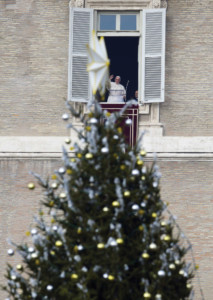
Christmas: “It is the encounter with Jesus. God has always sought out his people, led them, looked after them and promised to always be close to them.
What does Christmas mean for you?
“It is the encounter with Jesus. God has always sought out his people, led them, looked after them and promised to be always close to them. The Book of Deuteronomy says that God walks with us; he takes us by the hand like a father does with his child. This is a beautiful thing. Christmas is God’s meeting with his people. It is also a consolation, a mystery of consolation. Many times after Midnight Mass I have spent an hour or so alone in the chapel before celebrating the Dawn Mass. I experienced a profound feeling of consolation and peace. I remember one night of prayer after a mass in the Astalli residence for refugees in Rome; it was Christmas 1974, I think. For me Christmas has always been about this: contemplating the visit of God to his people.”
What does Christmas say to people today?
“It speaks of tenderness and hope. When God meets us, he tells us two things. The first thing he says is: have hope. God always opens doors, he never closes them. He is the father who opens doors for us. The second thing he says is: don’t be afraid of tenderness. When Christians forget about hope and tenderness, they become a cold Church that loses its sense of direction and is held back by ideologies and worldly attitudes, whereas God’s simplicity tells you: go forward, I am a Father who caresses you. I become fearful when Christians lose hope and the ability to embrace and extend a loving caress to others. Maybe this is why, looking toward the future, I often speak about children and the elderly, about the most defenseless, that is. Throughout my life as a priest, going to the parish, I have always sought to transmit this tenderness, particularly to children and the elderly. It does me good and it makes me think of the tenderness God has toward us.”
How is it possible to believe that God, who is considered by religions to be infinite and all-powerful, can make Himself so small?
“The Greek Fathers called it syncatabasis, divine condescension, that is: God coming down to be with us. It is one of God’s mysteries. Back in 2000, in Bethlehem, John Paul II said God became a child who was entirely dependent on the care of a father and mother. This is why Christmas gives us so much joy. We don’t feel alone any more; God has come down to be with us. Jesus became one of us and suffered the worst death for us, that of a criminal on the Cross.”
Christmas is often presented as a sugar-coated fairy tale. But God is born into a world where there is also a great deal of suffering and misery.
“The message announced to us in the Gospels is a message of joy. The evangelists described a joyful event to us. They do not discuss the unjust world and how God could be born into such a world. All this is the fruit of our own contemplations: the poor, the child that is born into a precarious situation. The (first) Christmas was not a condemnation of social injustice and poverty; it was an announcement of joy. Everything else are conclusions that we draw. Some are correct, others are less so and others still are ideologized. Christmas is joy, religious joy, God’s joy, an inner joy of light and peace. When you are unable or in a human situation that does not allow you to comprehend this joy, then one experiences this feast with a worldly joyfulness. But there is a difference between profound joy and worldly joyfulness.”
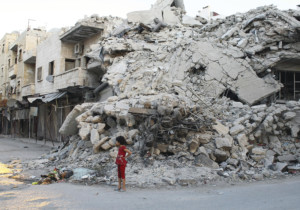
In this Sept. 8 photo, a girl stands in front of a building destroyed by what activists said was shelling by forces loyal to Syrian President Bashar Assad in the northern town of Ariha, Syria.
This is your first Christmas as Pope in a world marked by conflict and war…
“God never gives someone a gift they are not capable of receiving. If he gives us the gift of Christmas, it is because we all have the ability to understand and receive it — all of us from the holiest of saints to the greatest of sinners; from the purest to the most corrupt among us. Even a corrupt person has this ability; poor him, it’s probably a bit rusty, but he has it. Christmas in this time of conflicts is a call from God who gives us this gift. Do we want to receive Him or do we prefer other gifts? In a world afflicted by war, this Christmas makes me think of God’s patience. The Bible clearly shows that God’s main virtue is that He is love. He waits for us; he never tires of waiting for us. He gives us the gift and then waits for us. This happens in the life of each and every one of us. There are those who ignore Him. But God is patient and the peace and serenity of Christmas Eve is a reflection of God’s patience toward us.
This coming January marks the 50th anniversary of Paul VI’s historic visit to the Holy Land. Will you go?
“Christmas always makes us think of Bethlehem, and Bethlehem is a precise point in the Holy Land where Jesus lived. On Christmas night, I think above all of the Christians who live there, of those who are in difficulty, of the many people who have had to leave that land because of various problems. But Bethlehem is still Bethlehem. God arrived at a specific time in a specific land; that is where God’s tenderness and grace appeared. We cannot think of Christmas without thinking of the Holy land. Fifty years ago, Paul VI had the courage to go out and go there, and this marked the beginning of the era of papal journeys. I would also like to go there, to meet my brother Bartholomew, the Patriarch of Constantinople, and commemorate this 50th anniversary with him, renewing that embrace which took place between Pope Montini and Athenagoras in Jerusalem, in 1964. We are preparing for this.”
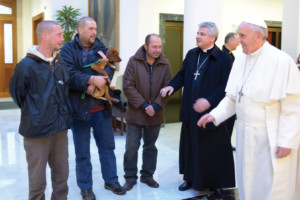
Pope Francis who, on his 77th birthday, celebrated morning Mass and had breakfast with three poor men.
You have met with seriously ill children on more than one occasion. What do you have to say about this innocent suffering?
“One man who has been a life mentor for me is Dostoyevsky and his explicit and implicit question ‘Why do children suffer?’ has always gone round in my heart. There is no explanation. This image comes to mind: at a particular point of his or her life, a child ‘wakes up,’ doesn’t understand much and feels threatened; he or she starts asking their mum or dad questions. This is the ‘why’ age. But when the child asks a question, he or she doesn’t wait to hear the full answer; they immediately start bombarding you with more ‘whys.’ What they are really looking for, more than an explanation, is a reassuring look on their parent’s face. When I come across a suffering child, the only prayer that comes to mind is the ‘why’ prayer. ‘Why, Lord?’ He doesn’t explain anything to me. But I can feel Him looking at me. So I can say: You know why, I don’t and You won’t tell me, but You’re looking at me and I trust You, Lord. I trust your gaze.”
Speaking of children’s suffering, we can’t forget the tragedy of those who are suffering from hunger.
“With all the food that is left over and thrown away we could feed so many. If we were able to stop wasting and start recycling food, world hunger would diminish greatly. I was struck by one statistic, which says ten thousand children die of hunger each day across the world. There are so many children who cry because they are hungry. At the Wednesday General Audience the other day there was a young mother behind one of the barriers with a baby who was just a few months old. The child was crying its eyes out as I came past. The mother was caressing it. I said to her: ‘Madam, I think the child’s hungry.’ ‘Yes, it’s probably time…’ she replied. ‘Please give it something to eat!’ I said. She was shy and didn’t want to breastfeed in public, while the Pope was passing. I wish to say the same to humanity: give people something to eat! That woman had milk to give to her child; we have enough food in the world to feed everyone. If we work with humanitarian organizations and are able to agree all together not to waste food, sending it instead to those who need it, we could do so much to help solve the problem of hunger in the world. I would like to repeat to humanity what I said to that mother: give food to those who are hungry! May the hope and tenderness of the Christmas of the Lord shake off our indifference.”
Some of the passages in Evangelii Gaudium attracted the criticism of ultraconservatives in the USA. As Pope, what does it feel like to be called a “Marxist”?
“The Marxist ideology is wrong. But I have met many Marxists in my life who are good people, so I don’t feel offended.”
The most striking part of the Exhortation was where it refers to an economy that “kills”…
“There is nothing in the Exhortation that cannot be found in the social doctrine of the Church. I wasn’t speaking from a technical point of view; what I was trying to do was to give a picture of what is going on. The only specific quote I used was the one regarding the ‘trickle-down theories’ which assume that economic growth, encouraged by a free market, will inevitably succeed in bringing about greater justice and social inclusiveness in the world. The promise was that when the glass was full, it would overflow, benefitting the poor. But what happens instead, is that when the glass is full, it magically gets bigger; nothing ever comes out for the poor. This was the only reference to a specific theory. I was not, I repeat, speaking from a technical point of view but according to the Church’s social doctrine. This does not mean being a Marxist.”
You announced a “conversion of the papacy.” Did a specific path emerge from your meetings with the Orthodox Patriarchs?
“John Paul II spoke even more explicitly about a way of exercising the primacy which is open to a new situation, not just from the point of view of ecumenical relations but also in terms of relations with the Curia and the local Churches. Over the course of these first nine months, I have received visits from many Orthodox brothers: Bartholomew, Hilarion, the theologian Zizioulas, the Copt Tawadros. The latter is a mystic; he would enter the chapel, remove his shoes and go and pray. I felt like their brother. They have the apostolic succession; I received them as brother bishops. It is painful that we are not yet able to celebrate the Eucharist together, but there is friendship. I believe that the way forward is this: friendship, common work and prayer for unity. We blessed each other; one brother blesses the other, one brother is called Peter and the other Andrew, Mark, Thomas….”
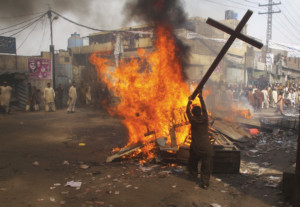
A demonstrator burns a cross during a protest in the Badami Bagh area of Lahore, Pakistan, March 9, 2013.
Is Christian unity a priority for you?
“Yes, for me ecumenism is a priority. Today there is an ecumenism of blood. In some countries they kill Christians for wearing a cross or having a Bible, and before they kill them they do not ask them whether they are Anglican, Lutheran, Catholic or Orthodox. Their blood is mixed. To those who kill we are Christians. We are united in blood, even though we have not yet managed to take necessary steps towards unity between us, and perhaps the time has not yet come. Unity is a gift that we need to ask for. I knew a parish priest in Hamburg who was dealing with the beatification cause of a Catholic priest guillotined by the Nazis for teaching children the catechism. After him, in the list of condemned individuals, was a Lutheran pastor who was killed for the same reason. Their blood was mixed. The parish priest told me he had gone to the bishop and said to him: ‘I will continue to deal with the cause, but both of their causes, not just the Catholic priest’s.’ This is what ecumenism of blood is. It still exists today; you just need to read the newspapers. Those who kill Christians don’t ask for your identity card to see which Church you were baptized in. We need to take these facts into consideration.”
In the Apostolic Exhortation you called for prudent and bold pastoral choices regarding the sacraments. What were you referring to?
“When I speak of prudence I do not think of it in terms of an attitude that paralyzes but as the virtue of a leader. Prudence is a virtue of government. So is boldness. One must govern with boldness and prudence. I spoke about baptism and Communion as spiritual food that helps one to go on; it is to be considered a remedy, not a prize. Some immediately thought about the sacraments for remarried divorcees, but I did not refer to any specific cases; I simply wanted to point out a principle. We must try to facilitate people’s faith, rather than control it. Last year in Argentina I condemned the attitude of some priests who did not baptize the children of unmarried mothers. This is a sick mentality.”
And what about remarried divorcees?
“The exclusion of divorced people who contract a second marriage from Communion is not a sanction. It is important to remember this. But I didn’t talk about this in the Exhortation.”
Will this issue be dealt with at the next Synod of Bishops?
“The synodality of the Church is important: we will discuss marriage as a whole at the Consistory meetings in February. The issues will also be addressed at the Extraordinary Synod in October 2014 and again at the Ordinary Synod the following year. Many elements will be examined in more detail and clarified during these sessions.”
How is the work of your eight “advisors” on Curia reform proceeding?
“There’s a lot of work to do. Those who wanted to make proposals or send ideas have done so. Cardinal Bertello has gathered the views of all Vatican dicasteries. We received suggestions from bishops all around the world. At the last meeting, the eight cardinals told me the time has come for concrete proposals, and at the next meeting in February they will present their suggestions to me. I am always present at the meetings, except for Wednesday mornings when I have the General Audience. But I don’t speak, I just listen, and that does me good. A few months ago, an elderly cardinal said to me: ‘You have already started Curia reform with your daily Masses in Domus Sanctae Marthae.’ This made me think: reform always begins with spiritual and pastoral initiatives before structural changes.”
What is the right relationship between the Church and politics?
“The relationship needs to be parallel and convergent at the same time. Parallel because each of us has his or her own path to take and his or her different tasks. Convergent only in helping others. When relationships converge first, without the people, or without taking the people into account, that is when the bond with political power is formed, leading the Church to rot: business, compromises… The relationship needs to proceed in a parallel way, each with its own method, tasks and vocation, converging only in the common good. Politics is noble; it is one of the highest forms of charity, as Paul VI used to say. We sully it when we mix it with business. The relationship between the Church and political power can also be corrupted if common good is not the only converging point.”
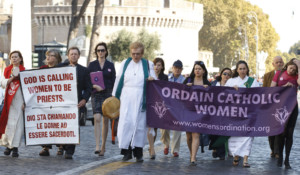
Maryknoll Father Roy Bourgeois, a U.S. priest who faces possible dismissal from his order and the priesthood for support of women’s ordination, marches down Via della Conciliazione toward the Vatican during a demonstration in Rome Oct. 17
May I ask you if the Church will have women cardinals in the future?
“I don’t know where this idea sprang from. Women in the Church must be valued, not ‘clericalized.’ Whoever thinks of women as cardinals suffers a bit from clericalism.”
How is the Institute for the Works of Religion (IOR)’s clean-up operation going?
“The commissions for reference are making good progress. Moneyval has given us a positive report and we are on the right path. As regards the future of the IOR, we will see. The Vatican ‘central bank,’ for example, is meant to be APSA (The Administration for the Patrimony of the Holy See). The IOR was established to help with works of religion, missions and the poor Churches. Then it became what it is now.”
Could you have imagined a year ago that you would be celebrating Christmas 2013 in St. Peter’s?
“Absolutely not.”
Were you expecting to be elected?
“No, I didn’t expect it. I never lost my peace as the number of votes increased. I remained calm. And that peace is still there; I consider it a gift from the Lord. When the final scrutiny was over, I was taken to the center of the Sistine Chapel and asked if I accepted. I said I did, and that I had chosen the name Francis. Only then did I walk away. I was taken to the next room to change (my cassock). Then, just before I made my public appearance, I knelt down to pray for some minutes in the Pauline Chapel along with Cardinals Vallini and Hummes.”
(This interview was first published on the Vatican Insider website on December 15).


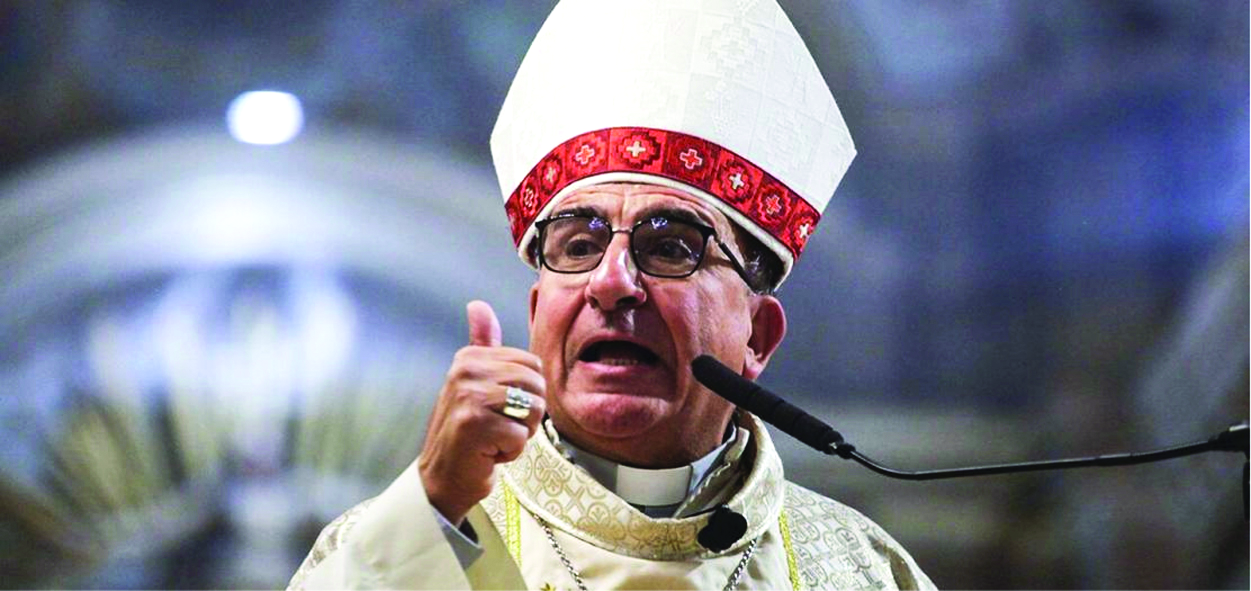
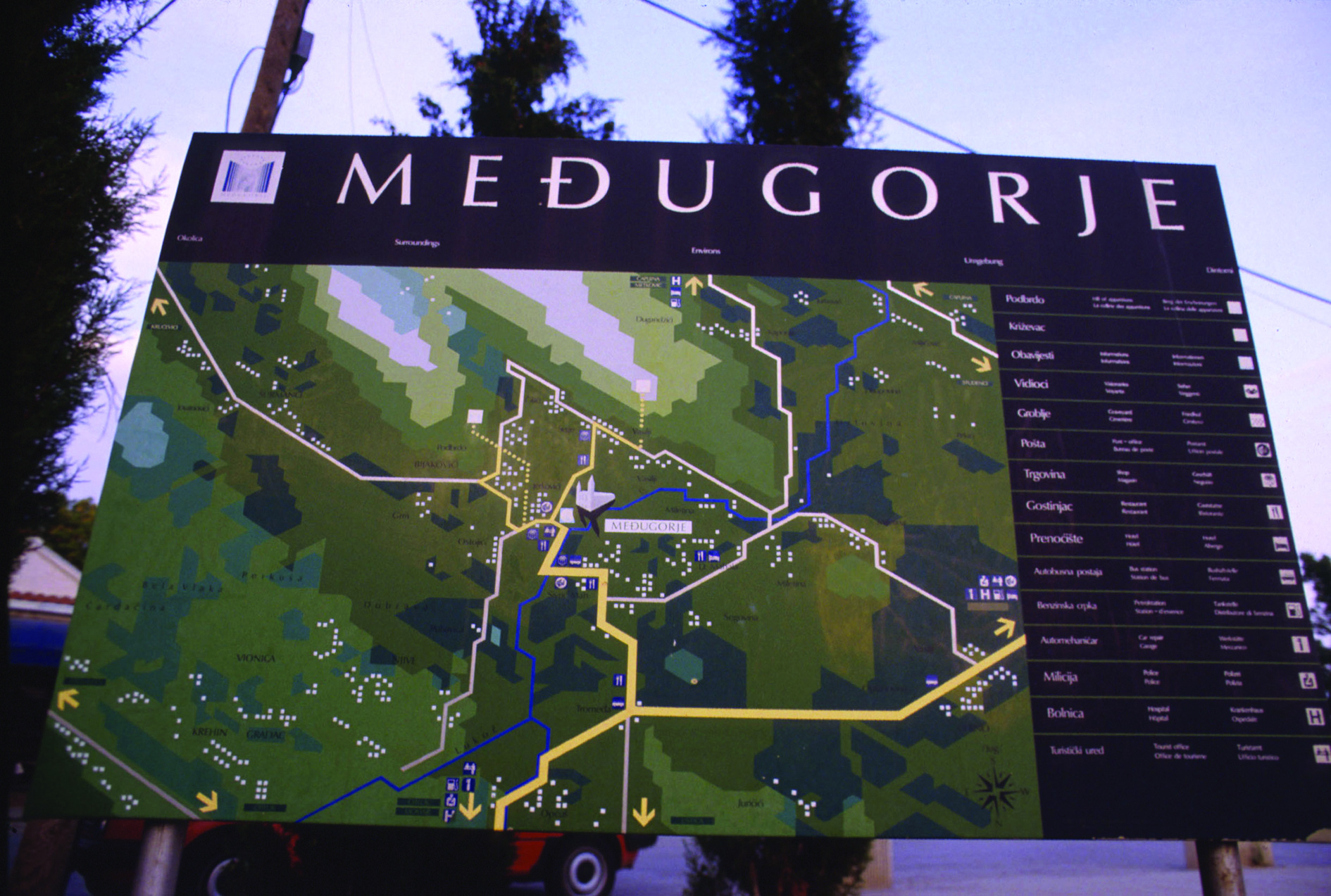
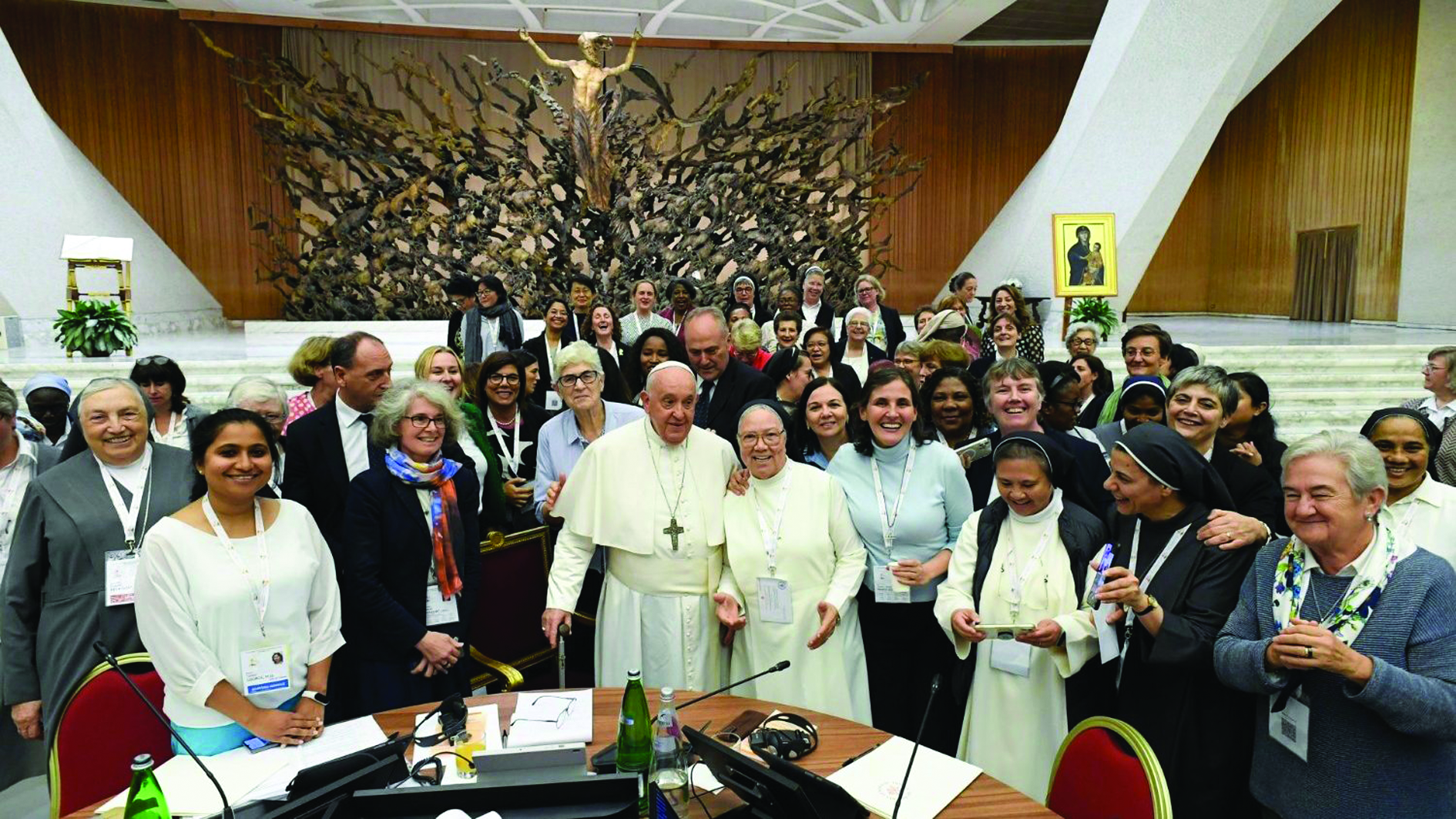

Facebook Comments